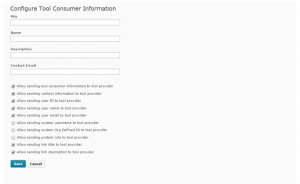Full disclosure. I’m an LMS administrator, and I’m probably a dick. I will say, in my defense, that I’ve never set up a system from scratch, but have contributed to configuration discussions, so I’ve been close to the decisions that get made in configuring a system, I’ve never had to do it. I have, however, had the opportunity to change the system and still have not, for many legitimate reasons. However, the controls that we could configure to be adjusted by the end user, in all practicality cannot be configured in that way due to the constraints of the software. The only platform that could be configured in such a way was First Class, which wasn’t an LMS, but a communication platform for collaboration (think SharePoint, but functional).
What if faculty could choose the tools they wanted, and essentially plug them into a system that housed their content and managed the enrollments? I don’t see this as any different than a faculty member choosing a textbook – however, the education system and people like me, LMS administrators and educational technology advocates everywhere, have made choices like this all but impossible because of the infantilism of faculty. We often treat faculty like they couldn’t, or shouldn’t make these choices. As educational technology professionals, we often just espouse what we think in much the same way a parent lectures their children. We talk about ways that technology should be used, instead of fostering a culture of creativity, we actually work against it in the interests of managing technology.
And there’s the ugly word: management. Systems administrator aren’t just administering systems, but really they’re administering people, and administering access to information. Some parties (students) shouldn’t have access to each other’s courses, so that’s a constraint on what we can do – especially if a system wasn’t (gasp) designed for it. Some parties (faculty) shouldn’t have access to each other’s courses to preserve intellectual property – the only capital they have under neoliberalism.
While we may be justified in many cases in saying that faculty don’t always look out for the finer details of educational technology (like privacy, or data collection, or accessibility) – it’s not because they couldn’t. I often wonder if we stopped running workshops on how to use the tools we support in place of teaching what the considerations are for using tools if faculty could be encouraged to take responsibility for their own teaching spaces?
Could institutions feasibly support hundreds of tools? Of course not, but instead of training people how to use tools, we should be training people how to select tools that respect user’s privacy, meet their needs and most of all, help students learn. Really it’s that simple.
